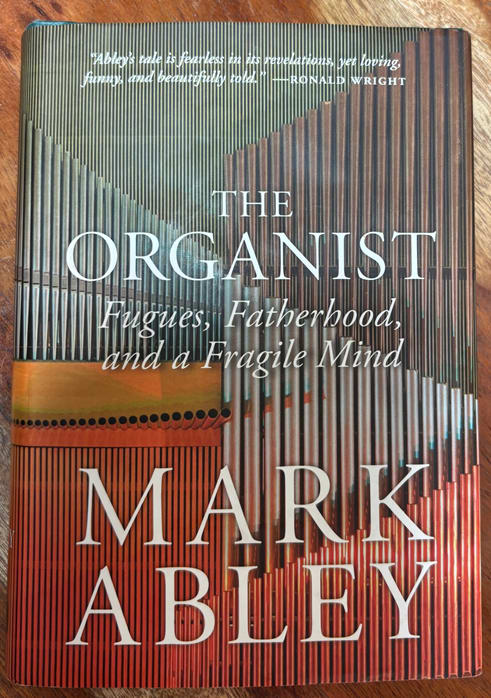What does a life add up to?
Reflections on The Organist: Fugues, Fatherhood, and a Fragile Mind by Mark Abley
Mark Abley asks the question repeatedly towards the end of his memoir. Insistently. Hauntingly. But the question remains a question—there is no definitive answer. Perhaps the book as a whole is his best approximation.
So what does a life add up to? The question takes on a distinct meaning when the life in question is that of an organist. Harry Abley was evidently a versatile composer, and a nurturing teacher. In those capacities, he left the world reams of scores, and dozens of trained musicians. His calling, however, was performing, whether it was accompanying a pre-war film in England’s cinemas, or a small parish church choir in Saskatchewan, or at an organ festival in Germany.
So what does this aspect of his life add up to? Organ music is ephemeral: sound waves form as air is blown through massive pipes, gone with the last reverberations off a church’s walls. If a recording is made, the music may live on in magnetic or digital form to be played back ad libitum. But the recording remains a recording, lacking the urgency of a live performance, the atmosphere of the venue, the togetherness of a congregation hearing it as one. Perhaps it leaves a specific memory, a fragment of a tune. Perhaps it leaves a mind changed in ways that words struggle to articulate.
A life, however, adds up to more than just professional accomplishments. The summation surely includes the imprint we leave on the next generation, and the imprint that Harry left on Mark forms the book’s principal theme. The imprint could be described as complex: jagged around the edges with parts missing in the middle. In the opening scene, one of the strongest, Mark describes his father locked in a bathroom refusing to come out, risking missing a flight. Mark pleads at the door as time grows tighter. Reading the scene, one suspects an episode of depression. This suspicion is confirmed as one reads on, and Harry’s untreated condition casts a brooding shadow over the family.
Moreover, Harry, an Englishman, exemplifies the stiff upper lip, that stereotypically English tendency towards stoicism, seldom talking about his experiences in the war or anything else emotionally fraught. Mark laments the missed connections, and the silences never broken. That said, there are moments of intimacy, especially towards the end of Harry’s life: helping turn the pages of his sheet music, caring for him in his final days.
I read The Organist for several reasons, mainly related to the fact that I’m writing a memoir of my own, one that touches on my own relationship with a father who could be hard to connect with. Among other things, I was looking for a point of reference in terms of genre, emotional register, narrative style and local colour. I found all of these things, though I especially appreciated Abley’s narration: understated, wryly funny on occasion, letting the reader fill in the blanks. At one point, for example, Mark suggests that Harry see a psychiatrist. Harry responds tersely and then silence sets in. There’s no need to describe the feeling; the feeling emerges from the context.
In the end though, I found more than I was looking for. Especially devastating was the final scene, where Harry dies after a long battle with cancer. Mark sits by his bed, holding his father’s hand as he breathes his last breath, a recording of his father playing Bach’s Fantasia and Fugue in C Minor playing in the background.
Reading this, I was struck, hard, by the contrast with my own father’s death. My father did not go gentle into that good night. Instead, it was a violent affair, a whirlwind in an emergency room medical bay with tubes, electrodes and a body flopping under the force of mechanized chest compressions. I thought: I wish my father could have had a more peaceful death.
Then I thought, what music would I have played if I had had the chance? And I realized that I didn’t know. So great was the distance between my father and I that couldn’t even guess with any certainty what he might find comforting. Harry and Mark had their relationship, fraught though it was. What did my father and I have?



Hi, a fan of yours here. Just wondering when the next one of these posts are going to come out! These bring me back to the good old days when people shared their opinions calmly by writing and not on those infuriating tik-tak videos. Wishing you the best for the summer!